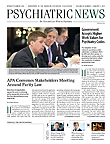The term “member-in-training” will soon disappear from the official APA lexicon. At their meeting last month in Arlington, Va., members of the APA Board of Trustees voted to replace the long-used terminology to describe residents and fellows with “resident-fellow member,” or RFM.
In backing a proposal voted by the APA Assembly at its November 2013 meeting, the Board agreed that the member-in-training nomenclature is often unclear to residents and fellows who are not APA members and to physician members of other specialty societies. To some, the Assembly proposal stated, the term “could be misunderstood as additional training, aside from residency training, that is required to become a member of APA.” The proposal noted as well that the Accreditation Council for Graduate Medical Education uses “resident” and “fellow” to describe physicians in training programs, as does the AMA, which has a Resident-Fellow Section. In addition, the National Board of Medical Examiners uses the terms “resident” and “fellow” in materials discussing employment opportunities through the annual Match system, the Assembly proposal pointed out.
Commenting on the name change, Erik Vanderlip, M.D., who was elected as the Member-in-Training Trustee and is now the Resident-Fellow Member Trustee, said, “Although seemingly subtle, the shift . . . heralds the beginning of a new era in APA member relations and communication—starting with its most vital demographic. The shift is emblematic in a number of ways. Initially proposed within the APA Assembly Committee of Residents and Fellows in November, it was championed through support from a variety of channels and rapidly approved by the Board in early December. It represents the nimble responsiveness of an organization ready to take good ideas from membership and convert them to action.”
The Board also voted to appoint an ad hoc work group that will examine ways to attract more minority and underrepresented group (M/UR) psychiatrists to APA membership and retain them as members once they join. Similar work groups have issued reports to the Board on recruitment and retention of early career psychiatrists and residents. The charge to the new work group includes identifying barriers that may be deterring M/UR psychiatrists from joining APA and remaining members over the long term and “determining the actual and perceived value of membership in APA for M/UR psychiatrists and trainees.” The proposal to establish the work group was supported by the Council on Minority Mental Health and Health Disparities.
Also at last month’s Board meeting, Howard Goldman, M.D., Ph.D., chair of the Board’s Health Care Reform Strategic Action Work Group, updated trustees on the group’s progress in developing ways to help members become educated about the how the changing health care system is likely to affect the way they practice. Goldman noted that by early spring the work group will have several products for the Board to review. Work group members are nearing completion of a toolkit to assist district branches and state societies on how to work with state officials to amend state plans regarding community-based services in the Medicaid program. A second toolkit will help members deal with Medicaid managed care contracts. In addition, the work group is preparing two white papers on performance measurement in behavioral health.
The work group is also focusing on educating psychiatrists on how to be effective clinicians in integrated or collaborative care settings and is considering development of a toolkit for members in conjunction with the AIMS Center at the University of Washington, which is dedicated to integrated care solutions in the mental health field.■


